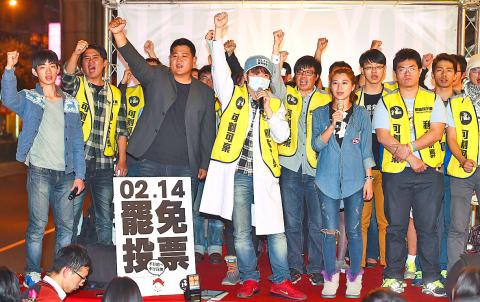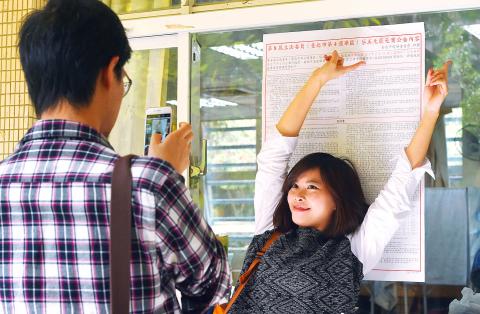Chinese Nationalist Party (KMT) Legislator Alex Tsai (蔡正元) yesterday survived a landmark recall referendum in his constituency — Taipei’s Neihu (內湖) and Nangang (南港) districts — because the poll failed to attain the required 50 percent voter turnout.
However, Tsai did not emerge unscathed, as an overwhelming majority of the 79,303 votes cast — marking turnout at 24.98 percent — supported the recall.
The Central Election Commission said that 76,737, or 97.22 percent, of the votes cast were in favor of ousting Tsai, while 2,196 people, or 2.78 percent, voted for him to stay. Just 370 votes were invalid.

Photo: Liao Chen-huei, Taipei Times
Given that there are 317,434 eligible voters in Tsai’s constituency, 158,717 voters were required to vote for the results to be valid.
The poll was the first recall in the nation since referendums in 1994 and 1995, when environmental activists failed to dislodge five KMT legislators over their support for a nuclear power plant.
The turnout threshold for referendums was raised from one-third to 50 percent by the legislature just months before the 1994 ballot, in a move widely seen as an attempt to prevent KMT legislators from losing their posts.

Photo: Liao Chen-huei, Taipei Times
The Appendectomy Project’s campaign was bolstered by scores of volunteers over its 10-month span. It ran two successful petitions last year.
At polling stations yesterday, a wide range of voters expressed their excitement that the recall election had been realized.
“I am very happy and excited because I am witnessing history — this is the first time we have been able to vote in a recall election,” said Victor Chen (陳立揚), a student at National Chiao Tung University, who returned from Hsinchu to vote.
“I am here today as a citizen to participate in the exercise of my power to recall,” a middle-aged woman surnamed Chiu (邱) said. “I think it is great that young people have been able to demonstrate that we have this power, and I want to encourage their efforts.”
Of three campaigns launched by the Appendectomy Project, the one targeting Tsai was the only one to reach its final phase, as petitions to recall KMT legislators Wu Yu-sheng (吳育昇) and Lin Hung-chih (林鴻池) both failed to draw support from at least 13 percent of voters from their respective constituencies.
Several hundred people trickled into the Appendectomy Project’s headquarters in Neihu yesterday evening to offer their support.
They said the campaign’s failure highlighted the need for a major overhaul of recall regulations, adding that the “largely unattainable” thresholds for voter turnout and the 30-day limit for petitions blocked voters from exercising their rights.
Appendectomy Project spokesman Lin Tzu-i (林祖儀) said the results indicated the failure of regulations, not the failure of the campaign and its more than 3,000 volunteers.
Lin said the group would continue campaigning for reform of the Civil Servants Election and Recall Act (公務人員選舉罷免法), and announced the group’s commitment to long-term efforts to promote direct democracy.
“Alex Tsai might be the archvillain now, but there are countless Alex Tsais out there,” Lin said.
Tsai called the results of the recall referendum “a great victory of democracy and rule of law.”
He added that the recall was initiated by a “political scam gang and professional students” and was “utterly despised by the public.”
“The number of votes cast was not even on par with those received by my opponents in the past election, which is a total embarrassment [to campaigners],” he added.
When asked by reporters about the recall threshold, Tsai said people might have different views.
He added that the number of votes to recall an official should have to top the number cast to elect them.
“That would require at least 120,000 votes to recall me,” he said.
Additional reporting by Alison Hsiao and Abraham Gerber

‘DANGEROUS GAME’: Legislative Yuan budget cuts have already become a point of discussion for Democrats and Republicans in Washington, Elbridge Colby said Taiwan’s fall to China “would be a disaster for American interests” and Taipei must raise defense spending to deter Beijing, US President Donald Trump’s pick to lead Pentagon policy, Elbridge Colby, said on Tuesday during his US Senate confirmation hearing. The nominee for US undersecretary of defense for policy told the Armed Services Committee that Washington needs to motivate Taiwan to avoid a conflict with China and that he is “profoundly disturbed” about its perceived reluctance to raise defense spending closer to 10 percent of GDP. Colby, a China hawk who also served in the Pentagon in Trump’s first team,

SEPARATE: The MAC rebutted Beijing’s claim that Taiwan is China’s province, asserting that UN Resolution 2758 neither mentions Taiwan nor grants the PRC authority over it The “status quo” of democratic Taiwan and autocratic China not belonging to each other has long been recognized by the international community, the Mainland Affairs Council (MAC) said yesterday in its rebuttal of Beijing’s claim that Taiwan can only be represented in the UN as “Taiwan, Province of China.” Chinese Minister of Foreign Affairs Wang Yi (王毅) yesterday at a news conference of the third session at the 14th National People’s Congress said that Taiwan can only be referred to as “Taiwan, Province of China” at the UN. Taiwan is an inseparable part of Chinese territory, which is not only history but

CROSSED A LINE: While entertainers working in China have made pro-China statements before, this time it seriously affected the nation’s security and interests, a source said The Mainland Affairs Council (MAC) late on Saturday night condemned the comments of Taiwanese entertainers who reposted Chinese statements denigrating Taiwan’s sovereignty. The nation’s cross-strait affairs authority issued the statement after several Taiwanese entertainers, including Patty Hou (侯佩岑), Ouyang Nana (歐陽娜娜) and Michelle Chen (陳妍希), on Friday and Saturday shared on their respective Sina Weibo (微博) accounts a post by state broadcaster China Central Television. The post showed an image of a map of Taiwan along with the five stars of the Chinese flag, and the message: “Taiwan is never a country. It never was and never will be.” The post followed remarks

INVESTMENT WATCH: The US activity would not affect the firm’s investment in Taiwan, where 11 production lines would likely be completed this year, C.C. Wei said Investments by Taiwan Semiconductor Manufacturing Co (TSMC, 台積電) in the US should not be a cause for concern, but rather seen as the moment that the company and Taiwan stepped into the global spotlight, President William Lai (賴清德) told a news conference at the Presidential Office in Taipei yesterday alongside TSMC chairman and chief executive officer C.C. Wei (魏哲家). Wei and US President Donald Trump in Washington on Monday announced plans to invest US$100 billion in the US to build three advanced foundries, two packaging plants, and a research and development center, after Trump threatened to slap tariffs on chips made